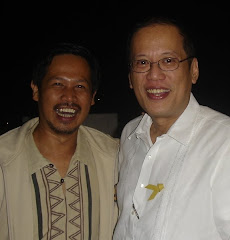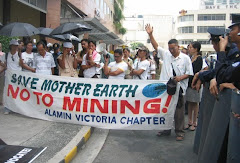ALAMIN'S POSITION PAPER IN SUPPORT OF HOUSE BILL NO. 6342 OR THE ALTERNATIVE MINING BILL
In connection with the Congressional Hearing on House Bill No. 6342 or the Alternative Mining Bill, the ALYANSA LABAN SA MINA (ALAMIN), a coalition of civil society groups and the Church, with the support from our local government units (LGUs) in Oriental Mindoro, hereby submit our statement of support for the bill while at the same time strongly reiterating our call, together with the Catholic Bishops’ Conference of the Philippines (CBCP) to repeal the Mining Act of 1995.
The Mining Act of 1995, which lays down the policy for the government’s near-fanatical campaign to attract foreign investors to invest in the mining industry distorts the goal of genuine development. By single-mindedly pursuing the economic benefits or financial gain, it failed to weigh the greater consideration in the equation - the human and ecosystems well-being, the human rights of the indigenous peoples and the local communities, the food security and ecological integrity of our country.
In pursuing the agenda for globalization, the government was made to serve particular interest – favoring primarily the transnational mining corporations. It is precisely for this reason that the Mining Act of 1995 was hailed by the international Mining Journal as “among the most favourable to mining companies anywhere.”
Admittedly, the Philippine Mining Act of 1995 is essentially crafted to attract foreign investors because with its provisions, the country’s right to sovereignty is relaxed in order to provide palatable incentives to transnational mining investors. Among the attractive features granted under the provisions of the Mining Act are as follow: 100% foreign ownership of mining projects, allowing foreign company to have a concession area of up to 81,000 hectares on shore and 324,000 hectares off shore, 100% repatriation of profit, 5 years tax holiday later extended to eight, and deferred payment are allowed until all cost are recovered, enjoyment of easement rights, and other auxiliary rights in mining concession, mining lease for 25 years, extendable to another 25 years, losses can be carried forward against income tax, among others.
The Mining Act of 1995 was primarily intended to serve foreign interest and not the local communities and it is never meant to legislate equitable sharing of resources, but on the contrary, it guaranteed clear profit margin to mining corporations, while selling our national patrimony for mere pittance share of taxes.
For the affected communities, large-scale mining does not promote authentic development but in fact, poses an imminent threat to their livelihood and the already fragile ecology. It is precisely for this reason that the Catholic Bishops’ Conference of the Philippines categorically calls for the repeal of the Mining Act of 1995 stating that:
We reaffirm our stand for the repeal of the Mining Act of 1995. We believe that the Mining Act destroys life. The right to life of people is inseparable from their right to sources of food and livelihood. Allowing the interests of big mining corporations to prevail over people’s right to these sources amounts to violating their right to life. Furthermore, mining threatens people’s health and environmental safety through the wanton dumping of waste and tailings in rivers and seas.
Our experiences of environmental tragedies and incidents with the mining transnational corporations belie all assurances of sustainable and responsible mining that the Arroyo Administration is claiming. Increasing number of mining affected communities, Christians and non-Christians alike, are subjected to human rights violations and economic deprivations. We see no relief in sight . . . The promised economic benefits of mining by these transnational corporations are outweighed by the dislocation of communities especially among our indigenous brothers and sisters, the risks to health and livelihood and massive environmental damage.
Our situation in Mindoro clearly illustrates the above-given concern. The Mining Act of 1995 clearly confers privileges and incentives to the large-scale mining of transnational companies, while the environmental and social costs are compromised if not at all relegated as the least among the priorities.
Mindoro is a fragile island ecosystem. The rate of degradation of the forest in the island of Mindoro is alarming. From the 967,400 hectares of forest in the 1950s, the remaining forest cover at present is only about 50,000 hectares. The significant forest lost of 95% contributed to the instability of the environment both in the upland and lowland areas.
But instead of restoring the balance, the forest ecosystems are now even more in danger of being denuded due to the threats posed by more than 92 mining applications all over the island of Mindoro.
At a more advanced stage is the Mindoro Nickel Project of Intex Resources and Aglubang Mining Corporation, covering 9,720 hectare-concession. Intex Resources is a subsidiary of a Norwegian Company, Intex ASA. The other local subsidiaries of Intex, namely, Pili Point Corporation (PPC), Alag-ag Mining, Inc. (AMI), Shapa Holding Corporation, have dubious credibility as to their capability to engage in mining and processing of mineral ore, considering that they have no proven track record as required by the law. And it is perceived that the subsidiaries are owned and managed by one and the same company of Intex.
The Mindoro Nickel Project threatens the food security and ecological integrity of Oriental Mindoro since the mining concession covers one of the province’s actual watershed areas as duly declared and identified in its Provincial Physical Framework Plan. The mining site encroaches on the Mag-asawang Tubig Watershed, which is the largest source of irrigation water for the 40,000 hectares collective rice land in the city of Calapan, Municipalities of Naujan, Baco and Victoria, Oriental Mindoro. The threatened municipalities and the City of Calapan have a combined rice production of 169,608 metric tons in 2006, which is 51% of the total provincial production, enough to feed 782,805 people for a year. In 2000, the estimated agricultural productivity of Oriental Mindoro at farm-gate price is PhP 11,414,553,000.000. Assuming that mining will adversely affect only 30% of the total productivity, the total loss of the province would be PhP 4.027 Billion!
Also, the mining concession is within the ancestral domain claim of the Alangan and Tadyawan indigenous Mangyan communities. The mining operation of Intex/Aglubang will result to the displacement of several Mangyan communities. The Mangyan Indigenous Peoples’ organizations of SANAMA and KAMTI, whose CADCs (Certificate of Ancestral Domain Claims) fall within the mining concession, had expressed their written opposition. However, the mining company, in collusion with some officials of the NCIP, organized a new tribal group, the Kabilogan, from whom they maliciously manufactured the document of consent for the mining activities through alleged misinformation and bribery. Instead of establishing social cohesion in order to empower the indigenous peoples to make decisions benefiting them, the very process of obtaining the free, prior and informed consent (FPIC) as prescribed in the Indigenous Rights Act (IPRA), had been deceptively used as a tool to divide the indigenous communities and to diffuse their collective identity in order for the mining companies to easily maneuver their entry.
The present political and economic policies of government, as contained in the Mining Act of 1995, further escalate these threats to indigenous peoples’ rights to land and life.
The Mindoro Nickel Project threatens the extremely rich biodiversity of the province, considered as the 7th most important biogeographic zones in the world. The 2002 Final Report on Philippine Biodiversity Conservation identified Mindoro, particularly the mining site, as extremely high conservation priority areas for plants and birds and terrestrial animals. In terms of importance level, the area belongs to extremely high terrestrial and inland water areas of biological importance.
The people’s unified stand against the Mindoro Nickel Project and their opposition to the entry of any mining operation in the province were clearly articulated in the Ordinance promulgated by the Sangguniang Panlalawigan of Oriental Mindoro on January 28, 2002, declaring a mining moratorium in the province. Since the economic thrusts of the Provincial Government of Oriental Mindoro are anchored on food sustainability, eco-tourism and the development of the agri-industry, the entry of mining operations is found to be detrimental to the sustainable development agenda of the province. Oriental Mindoro’s Provincial Physical Framework Plan specifically rules out the development of mining industry.
Mining under the present circumstances cannot even bring in the needed investment. The overly generous fiscal and non-fiscal incentives being given out by Mining Act of 1995 (including the Omnibus Investments Act, Export Development Act and Special Economic Zone Act of 1995), reduce the tax obligation to minimal cost possible. Even the Bastes Commission reported that Lafayette Mining in Rapu-rapu, Albay was able to reduce its tax obligations by 91%!
On April 6, 2009, Intex Resources was reported to be seeking PEZA perks and status. If this is granted, it will reduce all taxes of a registered company to just 5 percent of the gross earnings. And Mines and Geosciences Bureau’s economics head, Glenn Noble noted that: “This means the national and local government will not receive the rightful taxes they should get from mining operations, including the 12 percent excise tax, community taxes and income taxes.”
In the light of the foregoing and of many other issues and socio-environmental threats of mining, the Mindoro Nickel Project had been rejected overwhelmingly by the people of Mindoro and even by all the local government units.
But the mining company is taking advantage of the government’s policy, as prescribed in the Mining Act of 1995, to actively promote the mining industry by forcing its way in, running roughshod of peoples’ opposition, even violating our local government’s ordinance imposing a mining moratorium for 25 years!
Clearly, in our experience, the Mining Act of 1995 does not provide for effective and adequate mechanisms to protect the ecological integrity and the general welfare of the people, particularly the vulnerable sectors of the affected communities.
We stand united with the proponents of the Alternative Mining Bill that we need policy reform in extraction, development and utilization of our resources. We need to legislate a mining law that will truly protect the rights of the local stakeholder communities and the indigenous peoples, that will provide for a truly equitable sharing of benefits in royalties, that will ensure sustainable protection of the ecosystems as priority consideration, that will empower for genuine exercise of people’s decision-making and meaningful participation in the stewardship of the earth.
As Christians committed to our vision to promote life, justice and equity in an ecologically sustainable and people-oriented communities, we believe that environment should never be sacrificed - that “an economy respectful of the environment will not have the maximization of profit as its only objective, because environmental protection cannot be assured solely on the basis of financial calculations of cost and benefits. The environment is one of those goods that cannot be adequately safeguarded or promoted by market forces.” (John Paul II, Encyclical Letter Centesimus Annus, 40)
Submitted to the House Committee on the Environment for the Congressional Hearing on House Bill No. 6342, this 9th day of September 2009.
FR. EDWIN A. GARIGUEZ
Secretariat-Member
ALYANSA LABAN SA MINA
Oriental Mindoro









Post a Comment